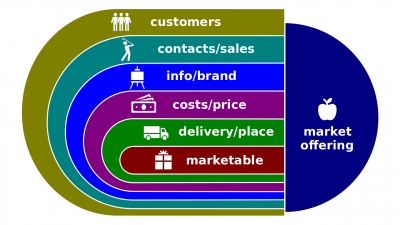Difference between revisions of "Market exchangeable"
(→Types) |
(→One's property) |
||
| Line 57: | Line 57: | ||
:[[software]] | :[[software]] | ||
| − | === | + | ===Private non-physical property=== |
:non-physical property. | :non-physical property. | ||
| + | ===Private physical property=== | ||
| + | :animals, buildings, hardware, land, produce | ||
| − | + | ===Community=== | |
| − | + | ===Government=== | |
| + | ===Person=== | ||
| − | + | ===Public property | |
| − | + | :Publicly-owned locations | |
| − | |||
| − | : | ||
==Classifications== | ==Classifications== | ||
Revision as of 22:29, 27 July 2020
A marketable (alternatively known as a marketable product or, simply, product; the marketable that has already been marketed is also known as marketed entity) is any item that can be sold or re-sold, as well as serve as a not-for-sale source of the items that can be sold or re-sold.
Trivia
Definitions
According to Marketing Management by Keller and Kotler (15th edition),
- Product. Anything that can be offered to a market to satisfy a want or need, including physical goods, services, experiences, events, person, places, properties, organizations, information, and ideas.
According to Managing Quality by Foster (6th edition),
- Product. A tangible good that is produced for a customer.
Product vs marketable
- Literally, product is anything that is produced. This term, product, has a wide range of applications:
- In business and marketing, product usually refers to the marketable that is produced by either an industrial process or farming to be sold and re-sold as a commodity.
- In business analysis, product may refer to work product that either business analysts produce or the customer seeks to obtain when their requirements are implemented.
- In effort administration, engineering, and project management, product usually refers to work product, so does this word, product, in the product backlog and product backlog item (PBI) terms.
- In mathematics, product is the result from the multiplication together of numbers or expressions.
- In social science, product is something or someone resulting from environment or a set of other conditions.
Types
Concept
Data
Enterprise
Event
Experience
Idea
Information
Labor
Permit
Financial products
Time
- personal time
Service
Software
Private non-physical property
- non-physical property.
Private physical property
- animals, buildings, hardware, land, produce
Community
Government
Person
===Public property
- Publicly-owned locations
Classifications
Intangible vs not-for-sale vs tangible
- With regard to its nature, a marketable can be one of the following:
- Intangible, which is something identifiable, but not tangible such as concepts, data, enterprises, events, experiences, ideas, information, labor, marketable permits, marketable securities and investment products, personal time, services, software, and any other non-physical property.
- Not-for-sale, which is anything that is not (such as publicly-owned locations or places) and/or cannot (such as communities, governments, and persons) be private properties.
- Tangible, which is a physical good such as animals, buildings, hardware, land, produce, and any other physical property.
Earned vs made vs purchased
- With regard to the way of its completion, a marketable can be one of the following:
- Work product or produced marketable, which is made as a solution or component of a solution that is the primary result of a project or operations. In other words, a produced marketable is an article or substance that is produced and refined for sale.
- Purchased item available for sale.
- Earned entity, which is not just a work product and cannot be sold itself, but is a not-for-sale source of the items that can be sold. These sources include communities, publicly-owned locations, governments, and people.
Features
- Marketing mix. A model representing distinguishable components of any product, which must include a deliverable, product delivery, and product charge.
- Product scope. All the features and functions that characterize a product.
- Service. Work carried out or on behalf of others.
